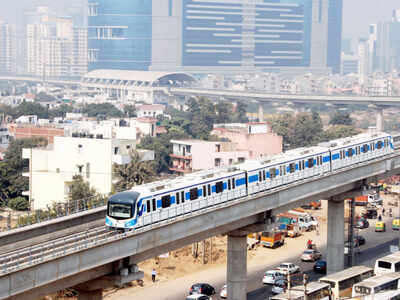
GURUGRAM: Amid desperate efforts to keep Rapid Metro running, a group of RTI activists on Saturday asked the Haryana government why it had made changes to the route. Rapid Metro has struggled with ridership.
Citing a 2016 report of the Comptroller and Auditor General, the activists pointed out that though the government got a survey done by RITES, it changed the route without consulting the state-run engineering consultancy company. The cost, which was supposed to be Rs 403 crore, went up to Rs 1,200 crore for the 5.1 km stretch
In fact, in its report, the CAG said that in March 2009, an expression of interest (EoI) was received from Rapid Metro Gurugram Ltd (RMGL), which proposed an alternative route of 5.1 km at an estimated project cost of Rs 900 crore.
The concession agreement was signed between HSVP (formerly Huda) and RMGL in December 2009.
“Huda had not stipulated in the EoI nor did it subsequently seek at any stage the detail for the alternative metro route of 5.1km though it got technical aspects of the project verified by DMRC (Delhi Metro Rail Corporation). After completion of the project, the concessionaire reported the project cost at Rs 1,088 crore. In the absence of any prior estimate of cost or financial viability, the reasonableness of this project cost could not be assessed,” the CAG report said.
The CAG report also mentioned how Huda’s signing of the contract resulted in “undue benefit” to the concessionaire of Rapid Metro. It cited a clause in the concession agreement under which Huda agreed to take over the complete system in case of termination of the contract.
“Huda shall pay to the lenders of the project, as per financial documents, an amount equal to 80% debt due as termination payment. Huda had entered into a concession contract assuming 80% of liabilities of the concessionaire in the event of termination of the contract and default of the concessionaire as to the costing of the project and extent of potential liabilities,” the report added.
“This clause cleanly means that if the project is successful then the credit goes to the promoters, while in case of failure, the government will bear losses,” alleged RTI activist Harinder Dhingra.
“The government is playing into the hands of a few companies. The Haryana government made selective changes to give benefits to the Rapid Metro concessionaire. There was no thought put into the project before accepting the terms of the deal,” said Ravinder Yadav, another RTI activist.
When contacted, D Suresh, the chief administrator of HSVP, refused to comment, saying “the matter is in court”.
Citing a 2016 report of the Comptroller and Auditor General, the activists pointed out that though the government got a survey done by RITES, it changed the route without consulting the state-run engineering consultancy company. The cost, which was supposed to be Rs 403 crore, went up to Rs 1,200 crore for the 5.1 km stretch
In fact, in its report, the CAG said that in March 2009, an expression of interest (EoI) was received from Rapid Metro Gurugram Ltd (RMGL), which proposed an alternative route of 5.1 km at an estimated project cost of Rs 900 crore.
The concession agreement was signed between HSVP (formerly Huda) and RMGL in December 2009.
“Huda had not stipulated in the EoI nor did it subsequently seek at any stage the detail for the alternative metro route of 5.1km though it got technical aspects of the project verified by DMRC (Delhi Metro Rail Corporation). After completion of the project, the concessionaire reported the project cost at Rs 1,088 crore. In the absence of any prior estimate of cost or financial viability, the reasonableness of this project cost could not be assessed,” the CAG report said.
The CAG report also mentioned how Huda’s signing of the contract resulted in “undue benefit” to the concessionaire of Rapid Metro. It cited a clause in the concession agreement under which Huda agreed to take over the complete system in case of termination of the contract.
“Huda shall pay to the lenders of the project, as per financial documents, an amount equal to 80% debt due as termination payment. Huda had entered into a concession contract assuming 80% of liabilities of the concessionaire in the event of termination of the contract and default of the concessionaire as to the costing of the project and extent of potential liabilities,” the report added.
“This clause cleanly means that if the project is successful then the credit goes to the promoters, while in case of failure, the government will bear losses,” alleged RTI activist Harinder Dhingra.
“The government is playing into the hands of a few companies. The Haryana government made selective changes to give benefits to the Rapid Metro concessionaire. There was no thought put into the project before accepting the terms of the deal,” said Ravinder Yadav, another RTI activist.
When contacted, D Suresh, the chief administrator of HSVP, refused to comment, saying “the matter is in court”.
Trending Topics
LATEST VIDEOS
More from TOI
Navbharat Times
Featured Today in Travel
Quick Links
Lok Sabha Election Schedule 2019Lok Sabha Election NewsDelhi Capitals teamMI team 2019Rajasthan Royals 2019RCB team 2019Maharashtra Lok Sabha ConstituenciesBJP Candidate ListBJP List 2019 TamilnaduShiv Sena List 2019AP BJP List 2019Mamata BanerjeeBJP List 2019 MaharashtraPriyanka GandhiBJP List 2019 KarnatakaAMMK Candidate List 2019BJP List 2019 WBLok Sabha Elections in Tamil NaduBSP List 2019 UPNews in TamilLok Sabha Poll 2019Satta Matka 2018PM ModiMahagathbandhanNagpur BJP Candidate ListChandrababu NaiduTamil Nadu ElectionsUrmila MatondkarNews in TeluguMadras High CourtTejashwi YadavArvind KejriwalTejasvi SuryaPawan KalyanArvind KejriwalYogi AdityanathJaya PradaSatta King 2019Srinagar encounter
Get the app







